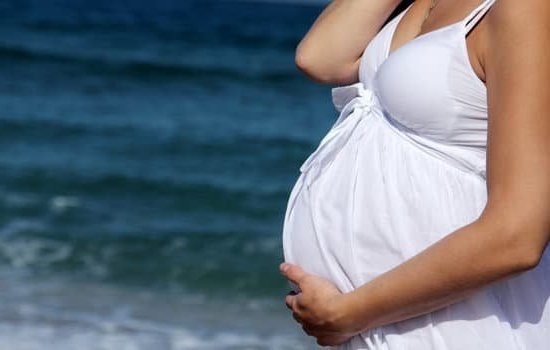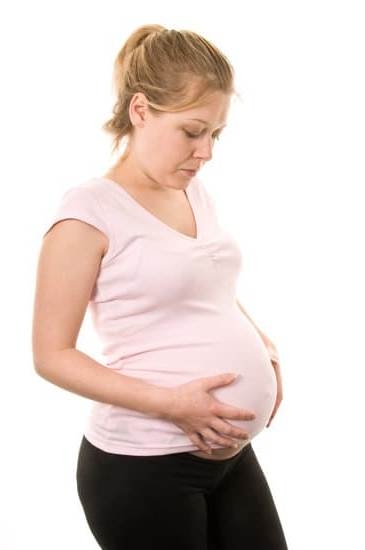Do you get your period during pregnancy? Understanding the relationship between menstruation and pregnancy is crucial for expecting mothers. The menstrual cycle plays a vital role in fertility, but what happens when conception occurs? This article delves into the intricacies of menstruation, ovulation, and pregnancy to shed light on this commonly asked question.
The menstrual cycle is a complex process that involves hormonal fluctuations, egg release, and uterine lining shedding. Ovulation typically occurs around mid-cycle, where an egg is released from the ovary to await fertilization. If fertilization does not occur, the uterine lining sheds, resulting in menstruation. However, when pregnancy happens, this cycle is disrupted as the body prepares for gestation.
Early pregnancy symptoms can sometimes mirror signs of menstruation, leading to confusion. Amenorrhea, or the absence of periods during pregnancy, is a clear indication of conception. However, implantation bleeding may cause some women to mistake it for a period. Understanding these nuances can help differentiate between normal bleeding during pregnancy and menstrual-like bleeding.
Menstruation and Ovulation Cycle
During the typical menstrual cycle, a woman’s body goes through various hormonal changes in preparation for possible pregnancy. The cycle begins on the first day of menstruation when the uterine lining sheds in the form of bleeding. This phase typically lasts around 3 to 7 days.
Following menstruation, the body enters the follicular phase, where hormone levels trigger the development of an egg within one of the ovaries. Around halfway through the cycle, ovulation occurs, whereby the mature egg is released and travels down the fallopian tube. This is usually when a woman is most fertile and likely to conceive if intercourse takes place.
If fertilization does not occur, the egg disintegrates and hormone levels drop, leading to the shedding of the uterine lining in another menstrual period. Understanding this cycle is crucial for women trying to conceive or those curious about their reproductive health. It also sheds light on why getting your period during pregnancy is not physiologically possible due to these hormonal mechanisms at play in a pregnant woman’s body.
- Menstrual bleeding marks the shedding of uterine lining
- Ovulation occurs midway through the menstrual cycle
- Maintaining a regular menstrual cycle can indicate overall reproductive health
Early Pregnancy Symptoms
During the early stages of pregnancy, it can be common for women to experience symptoms that may be mistaken for menstruation. These symptoms can include bloating, cramping, and even light spotting. Some women may also feel fatigued or have tender breasts, which are all signs that their body is undergoing hormonal changes due to pregnancy. It is important to note that these symptoms can vary from woman to woman and not all women may experience them.
Implantation Bleeding
One of the early signs of pregnancy that can be confused with menstruation is implantation bleeding. This occurs when the fertilized egg attaches itself to the lining of the uterus, causing some light spotting or bleeding.
It usually happens around the time a woman would expect her period but is typically lighter and shorter in duration than a typical menstrual period. If you experience light bleeding around the time you would expect your period, it could potentially be a sign of implantation bleeding rather than menstruation.
Misconceptions About Menstrual-Like Bleeding During Pregnancy
There is a misconception among some individuals that you can still get your period during pregnancy. However, this is not true. While it is possible to experience some light bleeding in early pregnancy, this is not considered a menstrual period.
Menstruation ceases during pregnancy because the thickened uterine lining needs to remain intact to support the developing fetus. If you are experiencing any bleeding during pregnancy, it’s essential to consult with your healthcare provider to rule out any potential concerns or complications.
Amenorrhea During Pregnancy
To further understand amenorrhea during pregnancy, here are some key points to consider:
- Pregnancy hormones, specifically human chorionic gonadotropin (hCG), maintain the uterine lining and prevent shedding, which leads to the absence of periods.
- While missing a period is a common early sign of pregnancy, it is important to note that other factors such as stress, weight fluctuations, or medical conditions can also cause menstrual irregularities.
- A missed period alone may not necessarily confirm pregnancy; taking a pregnancy test or seeking advice from a healthcare provider is essential for accurate diagnosis.
For those wondering “Do you get your period during pregnancy?”, it is crucial to remember that menstruation does not occur throughout pregnancy due to hormonal changes that support fetal development. If you suspect you may be pregnant or have concerns about your menstrual cycle, consulting with a healthcare provider can provide clarity and guidance on next steps.
Implantation Bleeding
Many women who experience implantation bleeding may confuse it with their regular period, especially if they are not actively trying to conceive. However, there are key differences between the two types of bleeding. Menstrual flow involves the shedding of the uterine lining, while implantation bleeding is caused by the embryo burrowing into the lining. Additionally, implantation bleeding is shorter in duration and lighter in flow compared to a typical period.
It’s important for women to track their menstrual cycles and be aware of any changes or irregularities in their bleeding patterns. If you are unsure whether you are experiencing implantation bleeding or your regular period, consider taking a pregnancy test to confirm.
Consulting with a healthcare provider can also provide clarity on any concerns about bleeding during early pregnancy. Remember, every woman’s experience with implantation bleeding can vary, so it’s essential to pay attention to your body and any potential signs of pregnancy during this time.
| Implantation Bleeding | Regular Period |
|---|---|
| Light spotting | Heavier flow |
| Shorter duration | Lasts several days |
| Ligher flow | Typically heavier flow |
Menstrual-Like Bleeding During Pregnancy
During pregnancy, it is a common concern for many individuals to wonder about the possibility of experiencing menstrual-like bleeding. This phenomenon can often lead to confusion and anxiety, as it may be challenging to differentiate between typical menstruation and abnormal bleeding during pregnancy. Understanding the causes and implications of such bleeding is crucial for expectant mothers to ensure their peace of mind and overall well-being.
Causes of Menstrual-Like Bleeding During Pregnancy
One of the primary reasons for experiencing menstrual-like bleeding during pregnancy is implantation bleeding. This occurs when the fertilized egg attaches itself to the uterine lining, leading to slight vaginal bleeding.
It is crucial to distinguish between this type of bleeding and a regular menstrual period, as implantation bleeding tends to be lighter in flow and shorter in duration. Other potential causes of menstrual-like bleeding during pregnancy include hormonal changes, cervical irritation, or complications such as placental issues or infections.
Importance of Consulting a Healthcare Provider
If you are experiencing any form of vaginal bleeding during pregnancy, it is essential to consult your healthcare provider immediately. While some light spotting may be considered normal, especially during early pregnancy, heavy bleeding or persistent spotting should not be ignored.
Your healthcare provider can perform necessary examinations and tests to determine the cause of the bleeding and provide appropriate guidance on managing your health and ensuring the safety of both you and your baby. Remember that seeking medical advice whenever you have concerns about vaginal bleeding during pregnancy is crucial for receiving timely care and support.
Periods During Pregnancy
During pregnancy, one of the most common questions that arise is whether or not a woman can still get her period. It is important to understand that menstruation typically stops during pregnancy. When a woman becomes pregnant, the body goes through numerous changes to accommodate the growing fetus, and one of these changes includes the suspension of the menstrual cycle.
The absence of periods during pregnancy is known as amenorrhea. This occurs because once conception takes place, the fertilized egg implants itself into the uterine lining, which prevents shedding of the uterine lining that would normally occur during menstruation. As a result, women do not experience their regular periods throughout the duration of their pregnancy.
Although there are instances where women may experience vaginal bleeding during pregnancy, it is crucial to differentiate between this bleeding and an actual menstrual period. Period-like bleeding during pregnancy may be due to various reasons such as hormonal changes, implantation bleeding, or other underlying issues. Therefore, if you are pregnant and notice any vaginal bleeding, it is essential to consult with your healthcare provider to rule out any potential complications.
| Key Point | Insight |
|---|---|
| Menstrual cycle during pregnancy | Menstruation typically stops during pregnancy due to changes in the body’s hormone levels. |
| Amenorrhea | The absence of periods during pregnancy is known as amenorrhea, caused by the implantation of a fertilized egg in the uterine lining. |
| Bleeding during pregnancy | Vaginal bleeding during pregnancy should be investigated by a healthcare provider to ensure maternal and fetal health. |
Conclusion
In conclusion, understanding the relationship between menstruation and pregnancy is crucial for women to navigate through their reproductive health journey. While it is not possible to have a period during pregnancy in the traditional sense, some women may experience bleeding that can be mistaken for periods. It is essential to pay attention to early pregnancy symptoms and seek medical advice if there are any concerns or uncertainties.
Amenorrhea, the absence of periods during pregnancy, is a natural phenomenon as the body adjusts to the changes brought about by gestation. Implantation bleeding, often confused with menstrual bleeding, occurs when a fertilized egg attaches to the uterus lining. Knowing the difference between these occurrences can help alleviate unnecessary worry and anxiety for expectant mothers.
Overall, it is vital for pregnant individuals to stay informed about their bodies and reach out to healthcare providers if they have any questions or experience abnormal symptoms. Seeking medical assistance promptly can ensure the well-being of both the mother and baby. Remember, every pregnancy is unique, so don’t hesitate to contact your healthcare provider whenever you have doubts or concerns about your reproductive health.
Frequently Asked Questions
Can You Get a Full Period and Still Be Pregnant?
It is possible to experience bleeding similar to a period and still be pregnant. This type of bleeding, known as implantation bleeding, can occur when the fertilized egg attaches itself to the uterine lining. It is usually lighter and shorter than a regular period.
Do You Get Your Period While You Are Pregnant?
While it is uncommon, some women may experience vaginal bleeding during pregnancy that resembles a period. This bleeding could be due to various reasons such as hormonal changes, implantation bleeding, or other underlying conditions. If you suspect you are pregnant but continue to bleed, it’s essential to consult with a healthcare provider.
Can You Bleed Like a Period in Early Pregnancy?
Bleeding in early pregnancy can sometimes mimic the characteristics of a period, but there are differences between the two. For instance, implantation bleeding tends to be shorter and lighter than a typical period flow. It’s crucial to differentiate between normal pregnancy-related bleeding and more concerning issues by seeking medical advice for any abnormal symptoms.

Welcome to my fertility blog. This is a space where I will be sharing my experiences as I navigate through the world of fertility treatments, as well as provide information and resources about fertility and pregnancy.





